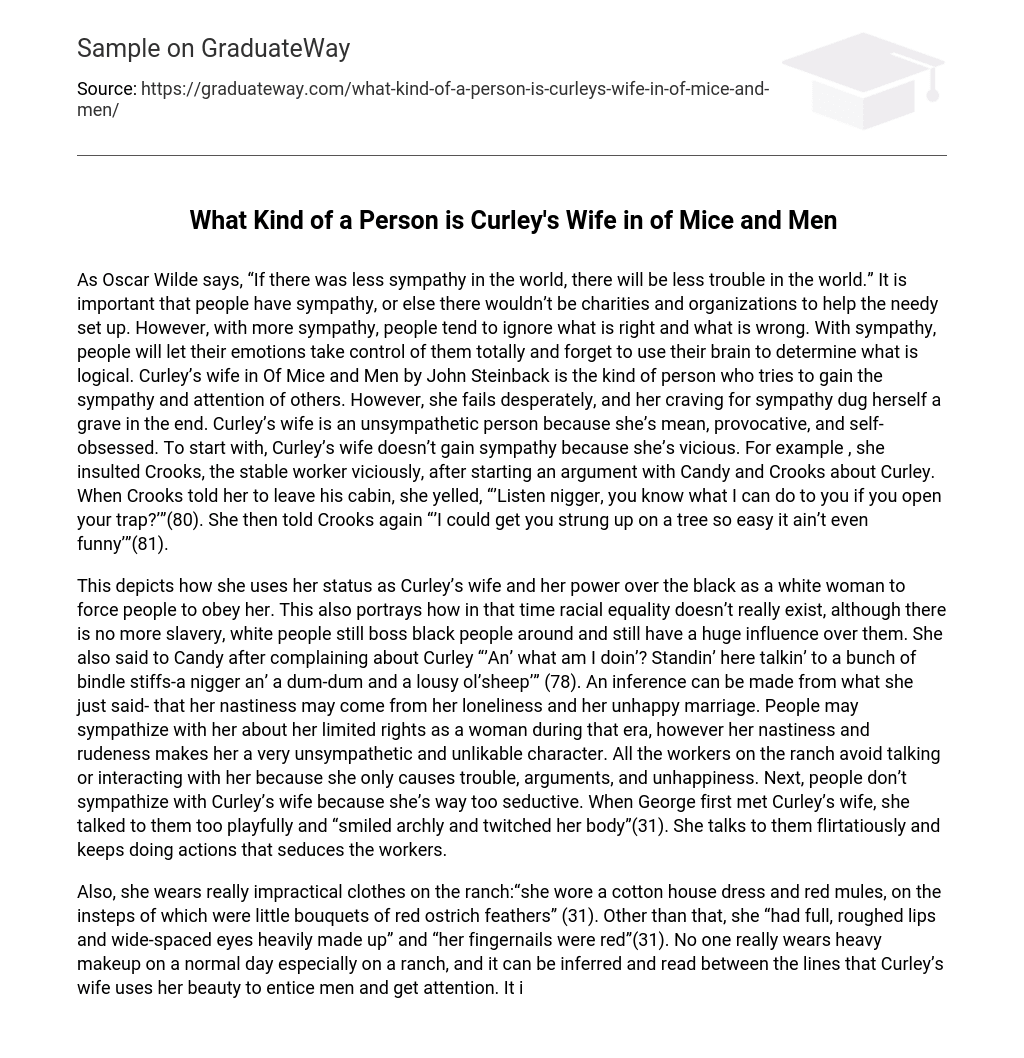As Oscar Wilde says, “If there was less sympathy in the world, there will be less trouble in the world.” It is important that people have sympathy, or else there wouldn’t be charities and organizations to help the needy set up. However, with more sympathy, people tend to ignore what is right and what is wrong. With sympathy, people will let their emotions take control of them totally and forget to use their brain to determine what is logical. Curley’s wife in Of Mice and Men by John Steinback is the kind of person who tries to gain the sympathy and attention of others. However, she fails desperately, and her craving for sympathy dug herself a grave in the end. Curley’s wife is an unsympathetic person because she’s mean, provocative, and self-obsessed. To start with, Curley’s wife doesn’t gain sympathy because she’s vicious. For example , she insulted Crooks, the stable worker viciously, after starting an argument with Candy and Crooks about Curley. When Crooks told her to leave his cabin, she yelled, “’Listen nigger, you know what I can do to you if you open your trap?’”(80). She then told Crooks again “’I could get you strung up on a tree so easy it ain’t even funny’”(81).
This depicts how she uses her status as Curley’s wife and her power over the black as a white woman to force people to obey her. This also portrays how in that time racial equality doesn’t really exist, although there is no more slavery, white people still boss black people around and still have a huge influence over them. She also said to Candy after complaining about Curley “’An’ what am I doin’? Standin’ here talkin’ to a bunch of bindle stiffs-a nigger an’ a dum-dum and a lousy ol’sheep’” (78). An inference can be made from what she just said- that her nastiness may come from her loneliness and her unhappy marriage. People may sympathize with her about her limited rights as a woman during that era, however her nastiness and rudeness makes her a very unsympathetic and unlikable character. All the workers on the ranch avoid talking or interacting with her because she only causes trouble, arguments, and unhappiness. Next, people don’t sympathize with Curley’s wife because she’s way too seductive. When George first met Curley’s wife, she talked to them too playfully and “smiled archly and twitched her body”(31). She talks to them flirtatiously and keeps doing actions that seduces the workers.
Also, she wears really impractical clothes on the ranch:“she wore a cotton house dress and red mules, on the insteps of which were little bouquets of red ostrich feathers” (31). Other than that, she “had full, roughed lips and wide-spaced eyes heavily made up” and “her fingernails were red”(31). No one really wears heavy makeup on a normal day especially on a ranch, and it can be inferred and read between the lines that Curley’s wife uses her beauty to entice men and get attention. It is possible that she’s doing all this because Curley never praised her and had his attention on her. However, her alluring actions and over the top clothing choice makes her a “tart” in the eyes of all the workers on the ranch (except Curley of course), which doesn’t help her get sympathy from others. As in modern day saying, “She’s playing too hard to get”. Last but not least, Curley’s wife is extremely unpitying because she’s constantly engrossed with herself. During the whole novel, it is mentioned several times that Curley’s wife should be in the “pitchers” (movies). For example, in the end when when she was confronting with Lennie, she said regretfully, “’A show come through an’ I met one of the actors…says I could go with that show…if I’d went I wouldn’t be livin’ like this you bet’”(88). During the same conversation, she says once again “’He says he was gonna put me in the movies.
Says I was a natural…he was gonna write to be about it”(88). After that, she says dreamily about all the designer and elaborate clothes she gets to wear, and the high-end life she gets to live. She always says that “’my ol’ lady stole it’” which is her mom stops the people from sending her to Hollywood, but she never thought about how she may not be as talented and star-like as she think she is (88). Other than wanting to be in the pitchers, she is always making sure her hair and her nails are kept up to the ultimate perfection. She’s once again considered a “bitch” (by George) and a “tart” (by Candy) because of this. Thus, because she’s always immersed in her “movie-star potential” and her looks, she gives off a negative aura, making her abhorred by others. In conclusion, Curley wife is unpitiful because she threatens others and is harsh to everybody, treating people with a different race without inequality. Also, she is like a Barbie doll on the ranch, being Barbie-like- flirting and beguiling every guy she sees. She thinks that she’s destined to be a movie star, and her wannabe quality makes her an obnoxious character. All in all, it is agreed in unison that she is a tart and trouble. It is often wondered by all readers, is this really what Steinbeck wants to show us, or is he trying to tell us something? It doesn’t matter if he’s trying to tell us that she’s just a small town girl with big dreams or an oppressed girl forced into marriage, no one pities her because of her vile personality and actions.





